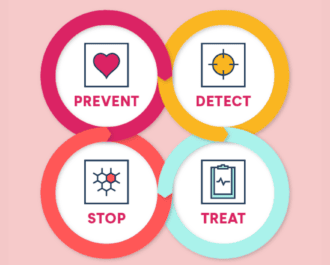
Breast screening is one of the most effective tools in our fight against breast cancer. Mammograms increase early detection and can prevent 8 breast cancer deaths per 1000 women aged over 50. However, the procedure is not always pleasant for women, especially those with body image concerns. Unfortunately, up to 50 per cent of women fail to attend the next screening visit after their initial experience.
Now, a federal government grant will support a study to determine how the experience of a mammogram can be improved for women. Associate Professor Jennifer Stone, from the University of Western Australia, has been awarded $800,000 from the National Health and Medical Research Council for her study BreastScreenPlus: A novel intervention targeting obesity-related barriers to mammographic screening.
Associate Professor Stone explains that there are several issues with current screening processes that can be improved.
“A mammogram is a very intimate exam. Members of our investigating team have demonstrated that body image plays a critical role in deterring women from mammographic screening, and that negative experiences by women with obesity drive reluctance to attend for future rescreening,” she said.
“These issues may be exacerbated by practical problems experienced by radiographers and lack of empathy from service delivery staff when screening women with obesity. As obesity is linked to poorer prognoses and lower breast cancer survival rates, improving rescreening rates within women with obesity is vital.”
Obesity has been associated with a 35-40% increase in the risk of breast cancer recurrence or death1, particularly for women diagnosed with estrogen receptor positive breast cancer. While it is still unclear why outcomes are worse for obese patients, removing the barriers to screening participation to ensure earlier detection of primary tumours and their recurrences might help to improve outcomes in these patients. The study will address known barriers to breast screening participation, including empathy training for clinicians and use of body positive images. The research team will also develop better information tools for women about mammograms and make the process more comfortable for all women.
The team hope that the interventions will improve rescreening rates, especially for those women who do not return due to body issues. This will lead to improved early detection rates in this high-risk group.
The research will be conducted in collaboration with BreastScreen Western Australia and researchers from the University of Western Sydney and the University of Melbourne. NBCF has proudly funded Associate Professor Stone’s work in breast cancer screening with over $1.2 million to date that has help to provide the foundations for this work and we are excited to see her continued success.
1Jiralerspong and Goodwin 2012 Journal of Clinical Oncology DOI: 10.1200/JCO.2016.68.4480 Journal of Clinical Oncology 34, no. 35 (December 10, 2016) 4203-4216
More News Articles
View all News


